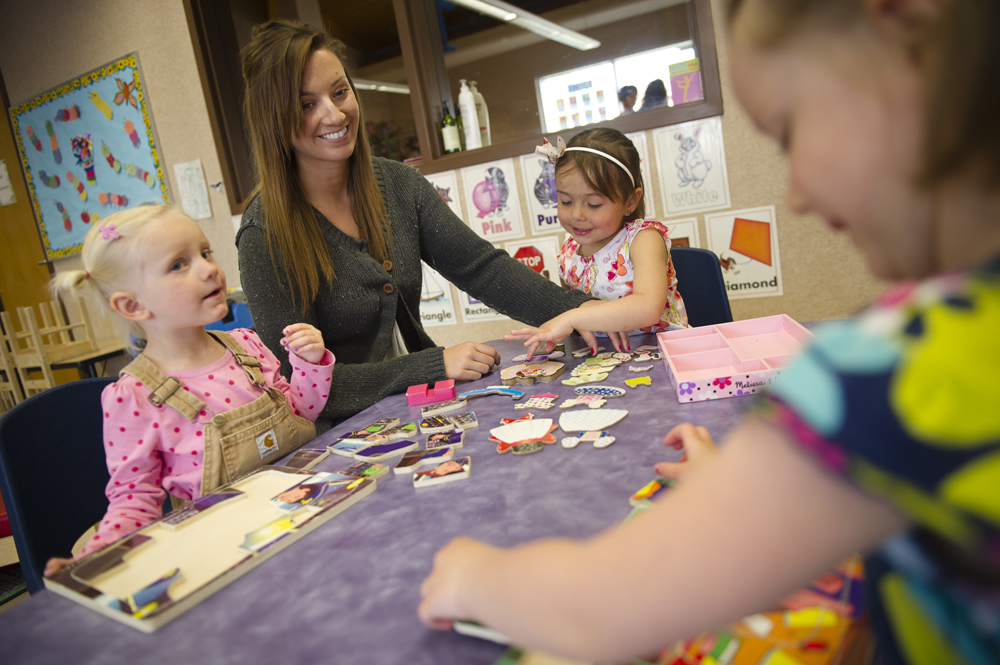The vision of the Early Learning (EL) program (formerly Early Learning and Child Care) is to meet the needs identified by the community for the educational preparation of early childhood educators.
Students develop the knowledge, skills and abilities necessary to provide early learning opportunities and child care for young children and families.
Throughout the program, students learn to assist children in all areas of growth and development.
Theory courses for the EL program offer the option of either face-to-face or video/online delivery.
Diploma program
The EL diploma program may be pursued on a full- or part-time basis. It consists of 60 credits and including a communications requirement and three practicum placements.
To accommodate students wishing to complete the diploma program, courses in EL are restricted to program students.
Year 1
The first year of the EL program is focused on providing time and space for emergent learning, deconstructing prior learning experiences, and reconstructing a learning pathway steeped in inquiry, relationship, and professional life-long learning.
Student achievement in Year 1 will be based on the Emerging, Developing, Practicing, and Wondering Assessment Framework. Students are expected to remain mainly in the emerging and developing stages as they progress through the core courses.
For the purposes of transcripts, Year 1 courses will be recorded as Pass/Fail and awarded credit but have no impact on student GPA.
Year 2
The second year of the program supports students in growth and continued development. Learning experiences remain steeped in inquiry, relationship, and professional life-long learning, and students will have an opportunity to choose electives that align with their professional interests.
Year 2 student achievement continues to be based on the Emerging, Developing, Practicing, and Wondering Assessment Framework. Students may begin to work in the practicing and wondering stages.
For the purpose of transcripts and to meet graduation requirements, Year 2 courses will be assigned grades and count toward student GPA.
To be eligible for admission into the Early Learning Diploma, a student must hold:
- One of English 12 (min 65%), ENGL 060/EAP 060 (min B-), OR acceptable equivalency scores on university assessments
- Acceptable current criminal record check including vulnerable sectors
- Current immunization including COVID-19 and tuberculosis screening
To receive a Yukon University Early Learning Diploma a student must:
- Pass all required and elective courses including 3 practicum placements
- Achieve a minimum 2.00 cumulative GPA (C average) across 200-level courses
- Complete a minimum of 30 credits (50% of the program) at Yukon University.
- Complete the Yukon First Nations core competency requirement
Yukon University recognizes that a greater understanding and awareness of Yukon First Nations history, culture and journey towards self-determination will help to build positive relationships among all Yukon citizens. As a result, you will be required to achieve core competency in knowledge of Yukon First Nations.
Students in the Early Learning Program acquire FN competencies within the program.
For details, visit Yukon First Nations Core Competency
Early Learning program graduates are qualified to work in the following areas:
- early childhood educators in child care centres
- family day homes, and preschools
- program assistants in child development centres and child-care facilities
- educational assistants in kindergarten and the early grades
- nannies, family support workers, and as child-care licensing officers
Fees
Tuition for credit programs is calculated per course credit. See money matters for more information.
Some programs and courses have additional fees - see Ancillary Fees.
Student financial awards
Education is an investment in your future, your family and your community. Yukon University is pleased to support that investment by offering some of the most competitive tuition rates in the country, as well as several student financial awards to help offset your educational and living costs.
Financial assistance
There are government programs, scholarships, bursaries, awards and First Nation funding available to financially support you throughout your academic career.
Follow this link to government funding: http://www.hss.gov.yk.ca/ecebursary.php
See money matters for more information, or talk to our financial advising staff in the Student Services Centre. Email or call 867 456 8574 to make an appointment.
